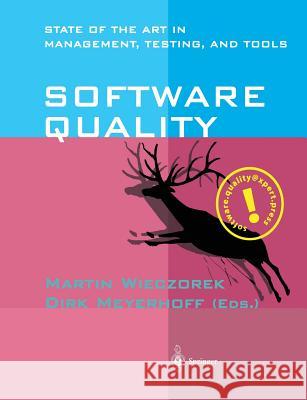Software Quality: State of the Art in Management, Testing, and Tools » książka
topmenu
Software Quality: State of the Art in Management, Testing, and Tools
ISBN-13: 9783540780854 / Angielski / Miękka / 2001 / 288 str.
Software Quality: State of the Art in Management, Testing, and Tools
ISBN-13: 9783540780854 / Angielski / Miękka / 2001 / 288 str.
cena 201,24
(netto: 191,66 VAT: 5%)
Najniższa cena z 30 dni: 192,74
(netto: 191,66 VAT: 5%)
Najniższa cena z 30 dni: 192,74
Termin realizacji zamówienia:
ok. 16-18 dni roboczych.
ok. 16-18 dni roboczych.
Darmowa dostawa!
With contributions by numerous experts











